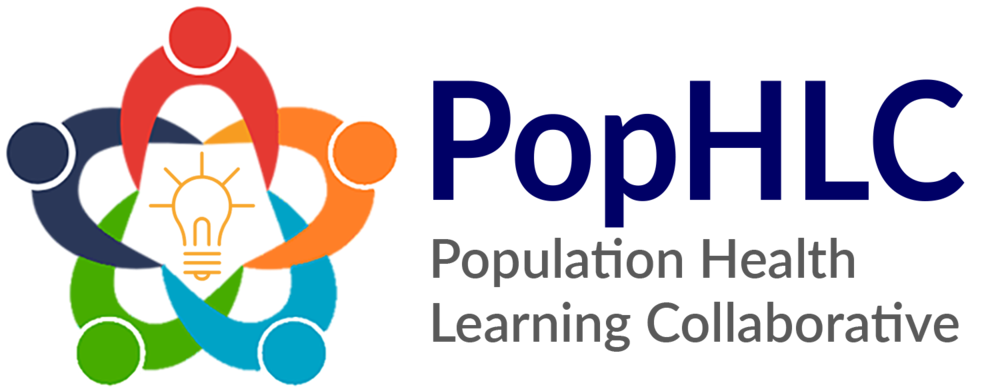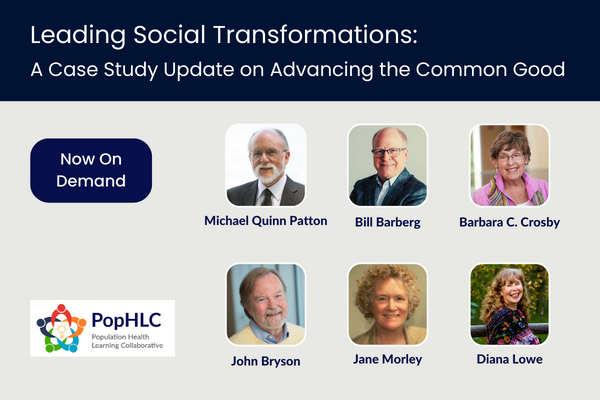Leading Social Transformations:
A Case Study Update on Advancing the Common Good
In May of 2021, the Journal of Change Management (Vol. 21, No. 2) published a peer-reviewed article entitled "Leading Social Transformations: Creating Public Value and Advancing the Common Good." The in-depth article focused on ways that the leadership for large-scale transformation is different from leading organizational strategies or relatively focused coalition strategies. One of the main case studies in the article involves efforts to transform the family justice system in Canada, starting with British Columbia and Alberta. That case study illustrates the use of innovative techniques and tools that build on a rich history of strategy management in ways that are designed to address social transformation in ways that create value and enhance the common good.
This webinar digs deeper into those techniques and tools in the context of an updated and deeper dive into the Canadian case study. Each of the article's four authors will share more about the power and potential of these emerging practices and tools. They will be joined by two leaders of the Canadian initiative who can share more insights on how this approach is building momentum and increasing the odds of accomplishing their bold aspirations.
Success in addressing the "wicked problems" facing societies around the globe will be enhanced when there are more powerful and effective approaches to transforming the systems that contribute to those problems. This webinar shares the potential of some of the new approaches that offer hope for a brighter future.
Speakers
Michael Quinn Patton is the Founder and CEO of Utilization-Focused Evaluation, an independent organizational development, and program evaluation organization.
He has authored numerous books on evaluation, including Blue Marble Evaluation (2019), Principles-Focused Evaluation (2018), Facilitating Evaluation (2018), Developmental Evaluation (2010) and Utilization-Focused Evaluation (2008). He has also edited or contributed articles to numerous books and journals, including several volumes of New Directions in Program Evaluation, on subjects as diverse as culture and evaluation, how and why language matters, HIV/AIDS research and evaluation systems, extension methods, feminist evaluation, teaching using the case method, evaluating strategy, utilization of evaluation, and valuing. His creative nonfiction book, Grand Canyon Celebration: A Father–Son Journey of Discovery, was a finalist for Minnesota Book of the Year.
Patton has received both the Alva and Gunnar Myrdal Award for “outstanding contributions to evaluation use and practice” and the Paul F. Lazarsfeld Award for lifetime contributions to evaluation theory awarded by the American Evaluation Association. The Society for Applied Sociology honored him with the 2001 Lester F. Ward Award for Outstanding Contributions to Applied Sociology. He was President of the American Evaluation Association in 1988 and Co-Chair of the 2005 International Evaluation Conference in Toronto sponsored jointly by the American and Canadian evaluation associations. He sits on the Editorial Advisory Board for The Foundation Review.
John M. Bryson is McKnight Presidential Professor Emeritus at the Hubert H. Humphrey School of Public Affairs at the University of Minnesota. He works in the areas of leadership, strategic management, collaboration, and the design of organizational and community change processes. He wrote the best-selling and award-winning Strategic Planning for Public and Nonprofit Organizations, 5th Edition (2018), and co-wrote with Barbara C. Crosby the award-winning Leadership for the Common Good, 2nd Edition (2005). He is a Fellow of the National Academy of Public Administration.
Professor Bryson has received many awards for his work, including five best book awards, six outstanding article awards, the General Electric Award for Outstanding Research in Strategic Planning from the Academy of Management, and the Distinguished Research Award, and the Charles H. Levine Memorial Award for Excellence in Public Administration, given jointly by the American Society for Public Administration and the Network of Schools of Public Policy, Affairs, and Administration.
He currently serves on the editorial boards of Academy of Management Discoveries, International Public Management Journal, Perspectives on Public Management and Governance, Public Management Review, and Public Performance and Management Review. Professor Bryson has served in a variety of roles at the university and Humphrey School, including twice being associate dean. He has consulted with a wide variety of governing bodies, government agencies, nonprofit organizations, and for-profit corporations in North America, Europe, Australia, and New Zealand.
Bill Barberg, a co-founder of the Population Health Learning Collaborative, is the President and Founder of InsightFormation, Inc., a Minnesota-based consulting and technology company that helps communities, regions, and states address complex social and health issues that require multi-stakeholder collaboration. His deep background in strategy implementation has been featured in dozens of conference presentations and webinars, and he both organized and hosted the recent virtual summit on Innovations in Naturally Affordable Housing. He has been a pioneer in many projects that have pushed forward the practices for achieving Collective Impact on a wide range of issues—from addressing the opioid crisis to transforming housing re-developments into Communities of Hope in Detroit.
Bill was selected to write the chapter on “Implementing Population Health Strategies” for the book, “Solving Population Health Problems through Collaboration” (Routledge, 2017). His recommendations for using strategy maps is featured as a core recommendation in the new report by the National Academy of Public Administration. Bill recently co-authored a paper for the Journal of Change Management on “Leading Social Transformations to Create Public Value and Advance the Common Good”.
Barbara C. Crosby is associate professor emerita at the Hubert H. Humphrey School of Public Affairs and former academic co-director of the Center for Integrative Leadership at the University of Minnesota. In 2017 she received the Leslie A. Whittington Excellence in Teaching Award from the Network of Schools of Public Policy, Affairs and Administration (NASPAA).
She is a fellow of the Leadership Trust in the UK, and during 2002-03, she was a visiting fellow at the University of Strathclyde, Glasgow, Scotland. Dr. Crosby was coordinator of the Humphrey Fellowship Program at the University of Minnesota from 1990 to 1993 and director of the Humphrey School's Reflective Leadership Center from 1999 to 2002.
She has taught and written extensively about leadership and public policy, integrative leadership, cross-sector collaboration, women in leadership, media and public policy, and strategic planning. She is the author of Teaching Leadership: An Integrative Approach (2016), Leadership for Global Citizenship (1999), and co-author with John M. Bryson of Leadership for the Common Good: Tackling Public Problems in a Shared-Power World (2d. ed. 2005). The first edition of the latter book won the 1993 Terry McAdam Award from the Nonprofit Management Association and was named the Best Book of 1992–93 by the Public and Nonprofit Sector Division of the Academy of Management.
She served many years on the editorial board of Leadership Quarterly. She and John M. Bryson were joint winners of the 2019 Keith G. Provan Award for Outstanding Contributions to Empirical Theory from the Public and Nonprofit Division of the Academy of Management.
Jane Morley, QC is responsible for the Transform the Family Justice System (TFJS) initiative - https://accesstojusticebc.ca/family-justice-collaborative/ - of Access to Justice BC, led by the Chief Justice of British Columbia Canada, is a network of individuals and organizations committed to improving access to civil and family justice through action that is user-centered, collaborative, experimental, and evidence-based. Access to Justice BC has recently committed to leading a cross-sector Collaborative to transform the family justice system by focusing on family well-being. The Collaborative will use a strategy mapping approach to align individuals and organizations, both within and beyond the justice sector, around common objectives and measures, and to coordinate mutually reinforcing activities directed at achieving this transformation.
Jane Morley is by profession a lawyer, by inclination a mediator, and by calling a leader of organizational and social change, especially in the areas of reconciliation with Indigenous peoples and justice reform. To learn more about her go to http://www.restorativesolutions.ca/our-team/jane-morley/
Diana Lowe, QC is a lawyer with 35 years of experience which includes legal practice, research, and reform of the civil and family justice systems in Canada, and most recently as Executive Counsel to the Chief Justice of the Court of Queen’s Bench of Alberta. In 2008 she was appointed a Queen's Counsel (QC) in Alberta, where it is tradition to appoint lawyers who have made particular contributions to: the legal profession, or. public life, as Queen's Counsel. Diana recently retired from the Court and established a consulting practice - “Re-imagining Justice”. She continues to support the Reforming the Family Justice System (RFJS) initiative in Alberta, and also works with other jurisdictions interested in justice system transformation.
The RFJS is a multi-year, multi-sector collaboration, designed to effect system-wide change in the family justice system in Alberta, based on brain science and Adverse Childhood Experiences. The RFJS is seeking to shift the focus in family justice matters away from adversarial, legal responses, to making supports available to assist families with the social, relationship, parenting, and financial issues that arise in family matters. The outcome collaborators are seeking is family well-being, which they define as “Helping Families Thrive”.








































